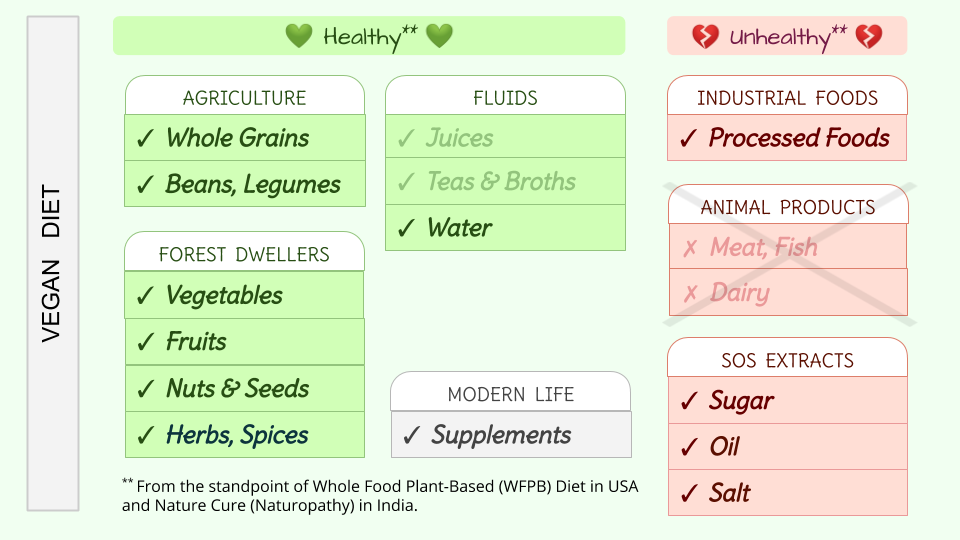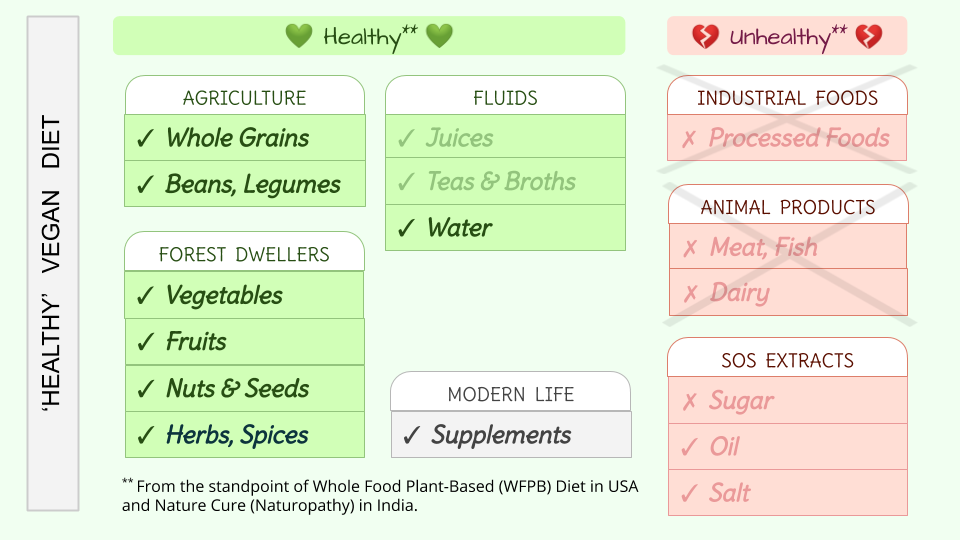A Vegan Diet is adopted by those with compassion for all sentient beings, especially animals. So Meat, Fish, Milk and Eggs are eliminated.
The term Veganism was coined in 1944 by a British woodworker and animal rights advocate named Donald Watson (1910-2005) to christen a lifestyle choice which entailed no consumption of animal products. A vegan was defined as a 'non-dairy vegetarian who also ate no eggs'. In UK, The Vegetarian Society had existed since 1847; Donald Watson carved out The Vegan Society in 1944. Both organizations continue to exist even today.
Recent History:
- Veganism (Wikipedia article).
- A Brief History of Veganism (TIME Magazine): too brief.
- A longer history of Veganism (MainStreetVegan): many more details but understandable to only those who are already familiar with veganism.
- Gandhi's role in veganism: he gave a historic speech in England in 1931 imploring people to adopt the moral choice that is known as veganism today.
- Ripened by Human Determination — 70 Years of The Vegan Society: written by Donald Watson himself in 2004.
As far as I can tell, many individuals have been vegan from birth to death. We even have small-sized communities that are vegan, for example, 4000-strong village in Israel that adopted veganism for better health and the Akashinga in Africa who adopted veganism to protect the environment from poachers. But has any large-sized population been vegan (or almost vegan) for multiple centuries? The Blue Zones provide an answer.
The Blue Zones: The Blue Zones (2nd Edition) (336 pages, 2012) by Dan Buettner explores the lifestyle of communities in the world with the maximum percentage of centenarians in the population. Centenarians are those who live beyond hundred years of age. These communities include the Barbagia region of Sardinia, Ikaria (Greece), Okinawa (Japan), The Seventh Day Adventist community in Loma Linda (California) and the Nicoya Peninsula in Costa Rica. Buettner identified nine factors that contribute to the longevity of Blue Zone residents. Many of these factors pertain to food habits! My understanding is that these communities are 'almost vegan', not 100% vegan. But there are pockets of sub-communities (for example, some %age of Seventh Day Adventists) who are 100% vegan.
Vegans are drawn to plant based diets out of compassion for other sentient beings. Diet For A New America (2nd Edition, 464 pages, 2012) by John Robbins brought this awareness into the the public conscience. The first edition of this book was published in 1987 and was a bestseller.
In recent times, Gary Yourofsky has attempted to spread awareness with his hard hitting speeches and tv interviews. Gary is doing a great job spreading awareness. However, he expresses vitriolic anger towards the meat eating human population. Instead, if he were to exude compassion for everybody (including those who consume animal products), his message would touch many more hearts.
Melanie Joy gives insightful talks to kindle compassion for animals. She has studied the psychology of animal eating.
- TED Talk: Toward Rational, Authentic Food Choices (19 mins, 2015).
- The Secret Reason We Eat Meat (18 mins, 2015).
One of the best videos I've come across that makes a case for compassion for animals is this one: The Secrets of Food Marketing (7 mins, 2014) by Kate Cooper. Must watch!
Several other videos encourage us to question our food choices. A couple of videos by "Mic the Vegan" are thought-provoking: Carnism: Do You Love Animals? (Not Graphic) (3 mins, 2015) and Why Good People Eat Bad Things (8 mins, 2016).
Some documentaries that have familiarized people with the plight of farmed animals: Food Inc (91 mins, 2009), Earthlings (95 mins, 2010) and Meat the Truth (YouTube, 72 mins, 2010). A comprehensive list of documentaries: here.
Food Choices & Environment for details.
In addition to eliminating Meat and Dairy, if we also eliminate Processed Foods (from plant sources) and Refined Sugars, and greatly reduce Oils and Salt, we start getting a 'Healthy' Vegan Diet.
As a next step, if we completely eliminate Oils as well, we reach a Whole Food, Plant-Based Diet (WFPB Diet).

 Instagram
Instagram YouTube
YouTube
